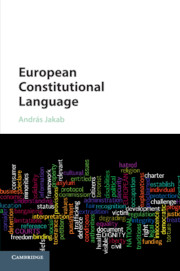Book contents
- European Constitutional Language
- European Constitutional Language
- Copyright page
- Dedication
- Contents
- Tables
- Preface
- 1 Introduction
- Part I The grammar: the rules of constitutional reasoning
- Part II Suggested vocabulary as a patchwork historical collection of responses to different challenges
- Part III Redundant vocabulary
- Part IV Concluding remarks
- Bibliography
- Index
- References
Bibliography
Published online by Cambridge University Press: 05 April 2016
- European Constitutional Language
- European Constitutional Language
- Copyright page
- Dedication
- Contents
- Tables
- Preface
- 1 Introduction
- Part I The grammar: the rules of constitutional reasoning
- Part II Suggested vocabulary as a patchwork historical collection of responses to different challenges
- Part III Redundant vocabulary
- Part IV Concluding remarks
- Bibliography
- Index
- References
- Type
- Chapter
- Information
- European Constitutional Language , pp. 403 - 486Publisher: Cambridge University PressPrint publication year: 2016



